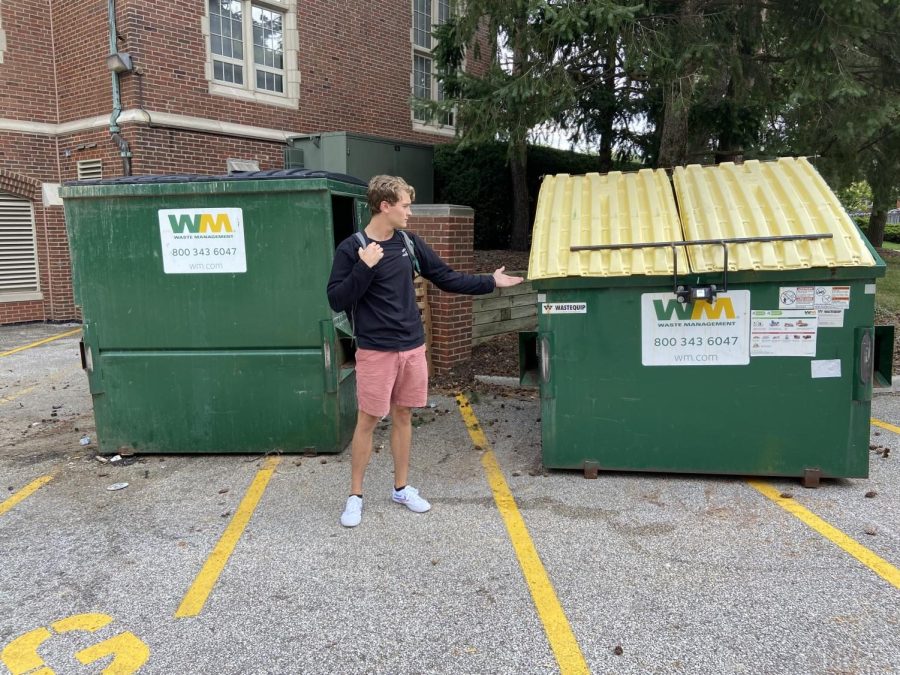Are on-campus tours intentionally deceptive?
Eric Fogle, Unlicensed Tour Guide, practices gesturing to one of JCU’s finest dumpsters.
Sep 16, 2022
No matter where I go around campus, I seem to find myself somewhere in the route of an on-campus tour. As a compulsive and irredeemable eavesdropper, I can’t help but overhear some of the things tour guides tell potential students. These things range from personal testimonies about the areas (“I study here all the time”) to general informatory statements about the space or campus (“this is our newly renovated [everything]”). Hearing it infuriates me without fail.
In short, I find the act of selling John Carroll to be questionably moral at best. I imagine a high school senior on a tour and hearing claims about the University’s commitments to this, its dedication to that, and a bunch of other abstract and technically unfalsifiable claims. I imagine that same senior coming here and finding nothing tangible to meet the abstractions they were promised during their tour.
There is a clear and undeniable purpose to tours of any college campus: to get people in the door. How tour guides do it isn’t the question. The question is of how many people they can get. Having a numerical incentive opens the door for tactics I find borderline deceptive. The principal tactic? Using empty language meticulously refined to appeal to the broadest number of people. Below is an example of what I mean.
“We at John Carroll University are committed to the academic excellence as well as the personal and spiritual development of every student. With an expansive alumni support system and a strong devotion to our Jesuit heritage, our graduates enter the world prepared and inspired to be leaders and serve a variety of communities, both local and global.”
That was off the top of my head. And it all sounds good enough to persuade people to come here, but when subject to critical analysis, it evaporates. The words sound good but mean nothing. You can’t find identity stuck to the bottom of desks, or a pool of community in a Boler bathroom floor.
A tour specific example: “We’re walking into the middle floor of the library. On the basement level, we have subject-specific tutors as well as the Den, where students can get coffee. During finals week, we’re open 24/7, and that’s the busiest it ever gets (*cue dad laughs*). I spend most of my time on the third floor, the quiet floor, because I need quiet to focus (*cue mom nods*).”
What do these made-up quotes have in common? They seem to omit negativity, their scope seems too narrow and they appear to rely on the ignorance of the audience. Tour guides and whoever comes up with the empty mission statements have a monopoly on the trust of potential students and their families.
In preparation for this column, I didn’t interview any tour guides. I don’t know what constitutes tour guide training (though I experienced RA training and have a suspicion that they’re very similar). Most importantly, it’s possible and likely that tour guides simply want to share their love of John Carroll with people who might be in their shoes down the line.
Because I didn’t give tour guides the opportunity to defend themselves, I’m compelled to backtrack and admit that this column isn’t about a centralized and misguided dislike for tour guides or the potentially delusive direction they receive from above. It’s ultimately about responsibility and who should assume it.
To this point, my position appears to overestimate the persuasive power of the on-campus guides and underestimate the ability of visitors to critically evaluate information. If I’m as right as my anger gets me believe, students enroll under unequivocally false pretenses and will eventually feel that they’ve been misled by a dishonest process.
It’s wrong for me to exaggerate the power of tours and tour guides in this way. By extension, it’s wrong to expect or demand any advertiser to include deal breakers for the sake of a more honest advertisement. Advertisement implies a degree of both exaggeration and omission. Responsibility should not (and clearly does not) fully rest on the integrity of advertising.
Similarly, visitors should not bear full responsibility to critically analyze every piece of information they receive during a visit. Visitors should have a critical awareness that everything they hear has been curated to persuade them, and they should take every word with a grain of salt.
Everyone, to the extent that we are in an eternal state of vulnerability to advertisements, should learn to critically evaluate their surroundings. Unfortunately for us, relentless and sneaky advertising can easily overwhelm our ability to evaluate. But here at The Carroll News we are dedicated to practicing scrutiny, devoted to the careful reflection and development of our ideas and committed to letting every tour we overhear remind us of shared responsibility and the three dimensionality of the world.














Carrie Buchanan • Sep 22, 2022 at 2:04 pm
Follow-up to my previous comment: You could also interview some freshmen and see if they feel deceived at all.
Carrie Buchanan • Sep 22, 2022 at 2:03 pm
I like the fact you were clear that you did not interview any tour guides. I recommend a follow-up column where you DO interview tour guides and get their reaction to what you said. It could be just as interesting as this one!
Laura • Sep 16, 2022 at 9:21 pm
This is so well written. Humorous and captivating simultaneously. Kudos.